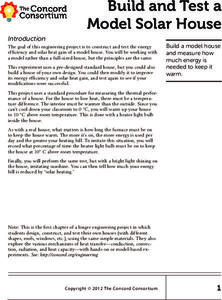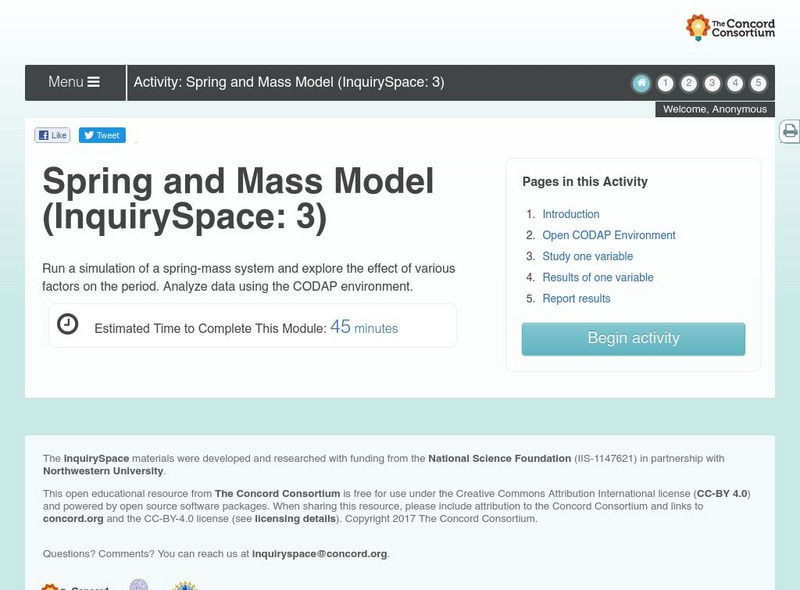Concord Consortium
Concord Consortium: Stem Resources: Bridges
A project where students design, build, and a test a bridge made out of file folders. Students will use a force sensor to measure how strong their model bridge is. Then students will compare their results to classmates to conclude what...
Concord Consortium
Concord Consortium: Stem Resources: Build and Test a Model Solar House
A learning unit with instructions on how to build a cardboard model house, and explore the effectiveness of a furnace vs. solar heating. The unit is in PDF format.
Concord Consortium
Concord Consortium: Stem Resources: Building a Bungee Jump
Students are asked to create a bungee jump that will protect a hard-boiled egg from breaking. A force sensor is needed to measure the push/pull forces on the egg. Data is inserted into force-time graphs. After completing three...
Concord Consortium
Concord Consortium: Stem Resources: Building a Zip Line
For this interactive, students plan, create, and test a zip line that will transport a hard-boiled egg without breaking it. They will make improvements on their design based on data about its performance. A motion sensor is required in...
Concord Consortium
Concord Consortium: Stem Resources: Changes in the Environment
An activity to help students understand that as the environment changes, plants and animals must evolve to stay alive. Students watch as a mystery plants grow in a changing environment to see if they will evolve or go extinct.
Concord Consortium
Concord Consortium: Stem Resources: Confliction Selection Pressures
Investigate how selection pressures and natural selection influence populations growth with this computer model. Understand how a population changes when selection pressures are in conflict. Perform the virtual lab to see what happens to...
Concord Consortium
Concord Consortium: Stem Resources: Describing Velocity
An interactive module where students record their ideas in response to questions, and read and manipulate graphs and charts while they learn about velocity-time graphs and position-time graphs.
Concord Consortium
Concord Consortium: Stem Resources: Dew Point
For this experiment, students work to find the dew point temperature in their classroom, or the temperature at which water would condense. Includes questions for students to respond to online. Requires free registration in order to save...
Concord Consortium
Concord Consortium: Stem Resources: Earthquakes Around the World
In this interactive, students manipulate a computer model that shows where earthquakes and volcanic eruptions have occurred since 1960, to make predictions, collect data and look for patterns. Includes career connection, and a question...
Concord Consortium
Concord Consortium: Stem Resources: Electrostatics
This web-based activity takes students through a series of pages in which they find out about the effects charged particles have on one another, discover how Coulomb's force works, and see some real-world examples. Multiple-choice and...
Concord Consortium
Concord Consortium: Stem Resources: Excited States and Photons
Students are able to explore the effects of energy on excitation of atoms through simulations, then relate this information to photons at atoms' absorption and emission of light. Multiple-choice and short answer questions are found...
Concord Consortium
Concord Consortium: Stem Resources: Gas Laws
A learning module with built-in interactive features where students can read background information on each gas law, then explore the interrelationships of pressure, temperature, and volume. Covers Boyle's Law, Charles's Law,...
Concord Consortium
Concord Consortium: Stem Resources: Greenhouse Light and Temperature
An interactive tool where students can create a model of a greenhouse and use a light sensor to measure the amount of light it receives from a lamp at various times of the day. Temperature is also measured. Data is plotted on graphs,...
Concord Consortium
Concord Consortium: Stem Resources: Molecular Self Assembly
A series of science simulations exploring how molecules assemble themselves and how scientists are learning to engineer their structure. Students will discover what patterns molecules form with interactive lessons. At the end there is a...
Concord Consortium
Concord Consortium: Stem Resources: Protein Partnering and Function
A learning module with built-in interactive features where students can read about the differences between large and small molecules, build protein structures, and test their strength under different conditions. They will review polarity...
Concord Consortium
Concord Consortium: Stem Resources: Quantum Tunneling
A learning module with built-in interactive features where students can explore the fascinating topic of matter tunneling through a barrier. They will learn how electron waves can sometimes manage this, devices that use this concept, and...
Concord Consortium
Concord Consortium: Stem Resources: Scanning Tunneling Microscopy
A learning module with built-in interactive features where students can observe how electrons behave. Using a virtual scanning tunneling microscope (STM), they experiment with moving the electrons inside an atom around. The STM has two...
Concord Consortium
Concord Consortium: Stem Resources: Wind Generator
Using a voltage sensor, students will measure how much "electricity" is produced by the wind turbine that they design and build. Students will experiment with blade designs to see which one collects energy from the wind the most...
Concord Consortium
Concord Consortium: Stem Resources: Pendulum
An interactive tool where students can explore how a pendulum works, and how length, mass, angle, and friction affect its motion or period. As the pendulum moves, its motion is shown in an angle-time graph.
Concord Consortium
Concord Consortium: Stem Resources: Pendulum and Spring
An interactive tool where students can explore how a pendulum behaves when attached to a spring, which means the length of the attachment is always changing. As the pendulum moves, its motion is shown on two graphs.
Concord Consortium
Concord Consortium: Stem Resources: Diffusion, Osmosis, and Active Transport
Have you ever wondered how important gases enter and leave cells? Take an up close tour of a pore in a cell membrane. Then explore diffusion, osmosis, and active transport through this collection of interactive models.
Concord Consortium
Concord Consortium: Stem Resources: Natural Selection
Build a dam in the middle of an ecosystem and observe how the population of plants and animals adapt to their new environment with this science simulation. Learn how the populations adapt to survive in their new habitat. Then remove the...
Concord Consortium
Concord Consortium: Science of Atoms and Molecules: Nucleic Acids and Proteins
Through this activity, students work with macromolecules, proteins and nucleic acids. The focus is on the atomic structure of proteins, how linear polymers are made, and the surface charges of the resulting polymers. . Multiple-choice...
Concord Consortium
Concord Consortium: Spring and Mass Model
An interactive tool where students can explore how a spring behaves, and how changing the elasticity, mass, push/pull force, and friction affect its motion or period. As the spring moves, its motion is shown on a distance-time graph.

























